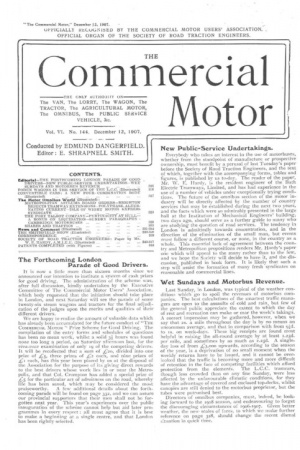The Forthcoming London Parade of Good Drivers.
Page 1

If you've noticed an error in this article please click here to report it so we can fix it.
It is now a little more than sixteen months since we announced our intention to institute a system of cash prizes for good driving. The administration of the scheme was, after full discussion, kindly undertaken by the Executive Committee of The Commercial Motor Users' Asseciation, which body requested that the initiation should take place in London, and next Saturday will see the parade of some twenty-six steam wagons and tractors for the final adjudication of the judges upon the merits and qualities Of their different drivers.
We are happy to realise the amount of valuable data which has already been accumulated for the future conduct of "THE COMMERCIAL MOTOR " Prize Scheme for Good Driving. The compilation of the entry forms and schedules of questions has been no mean work, whilst a solid 3+, hours was found none too long a period, on Saturday afternoon last, for the viva-yore examination of only 19 of the competing -drivers. It will be recollected that a sum of .4.2(), divided into one prize of three prizes of 4,-2 each, and nine prizes of Lt each, has this year been placed by us at the disposal of the Association for the purpose of its giving direct rewards to the best drivers whose work lies in or near the Metropolis, and that Got. Crompton has added a special prize of .4;5 for the particular act of adroitness on the road, whereby life has been saved, which may be considered the most praiseworthy. A few additional details about the forthcoming parade will be found on page 332, and we can assure our provincial supporters that their men shall not be forgotten next year. This year's experiences over the public inauguration of the scheme cannot help but aid later programmes in every respect : all must agree that it is best to make a beginning at a single centre, and that London has been rightly selected.
New Public-Service Undertakings.
Everybody who takes an interest in the use of motorbuses, whether from the standpoint of manufacture or prospective ownership, must benefit by a perusal of last Tuesday's paper before the Society of Road Traction Engineers, and the text of which, together with the accompanying forms, tables and figures, is published by us to-day. The reader of the paper, Mr. W. E. Hardy, is the resident engineer of the Bath Electric Tramways, Limited, and has had experience in the use of a number of vehicles under exceptionally trying conditions. The future of the omnibus section of the motor industry will be directly affected by the number of country services that may be established during the next two years, and the facts which were so admirably presented in the large hall at the Institution of Mechanical Engineers' building; two days ago, should serve as a further guide to many who are studying the question of road services. The tendency in London is admittedly towards concentration, and in the direction of the elimination of the small man, but events must follow a different course, or none, in the country as a whole. This essential lack of agreement between the country and Metropolitan propositions renders Mr. Hardy's paper one which will appeal to the many rather than to the few, and we hope the Society will decide to have it, and the discussion, published in book form. It is likely that such a step will assist the formation of many fresh syndicates on reasonable and commercial lines.
Wet Sundays and Motorbus Revenue.
Last Sunday, in London, was typical of the weather conditions which go to spoil the revenues of motorbus com
panies. The best calculations of the smartest traffic managers are open to the assaults of cold and rain, but few of the general public appreciate the extent to which the day of rest and recreation can make or mar the week's takings. A correct impression may be gathered, however, when we say that 25. a mile throughout the day is by no means an uncommon average, and that in comparison with from 91d. to is. on week-days. These big receipts are found most helpful in raising the all-round average by at least I.25d. per mile, and sometimes by as much as 2.25d. A singleday loss of from £3,000 upwards, acoording to the season of the year, is a deprivation of no small moment when the weekly returns have to be issued, and it cannot be overlooked that the traffic is becoming more and more difficult of retention in the face of competing facilities which afford protection from the elements. The L.C.C. tramcars, though less crowded than on any fine Sunday, were less affected by the unfavourable climatic conditions, for they have the advantage of covered and enclosed top-decks, whilst canopies are still denied to the motorbus proprietor, but the tubes were patronised best. Directors of omnibus companies, must, indeed, be looking forward to the 1908 season, and endeavouring to forget the discouraging circumstances of 1906-i-907. Given better weather, the new scales of fares, to which we make further reference on page 328, should change the recent dismal situation In quick time.




























